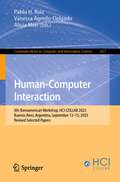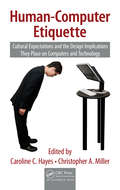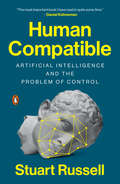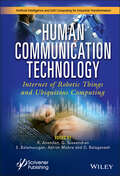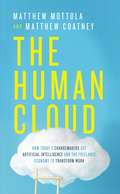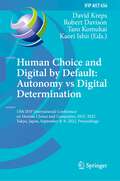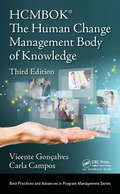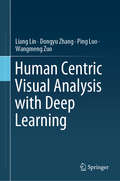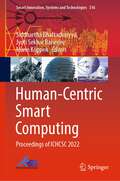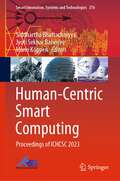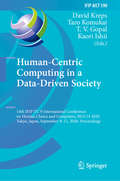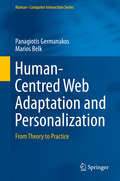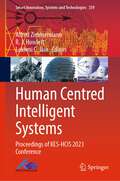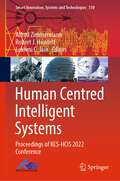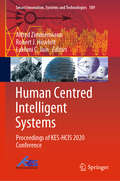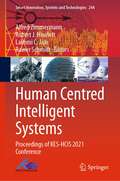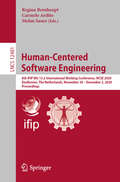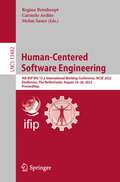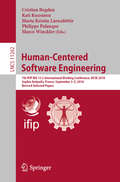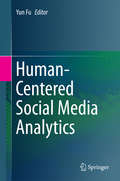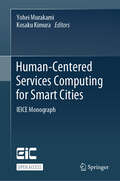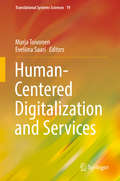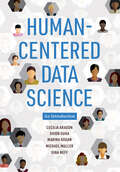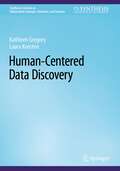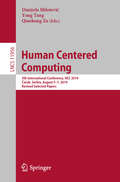- Table View
- List View
Human-Computer Interaction: 9th Iberoamerican Workshop, HCI-COLLAB 2023, Buenos Aires, Argentina, September 13–15, 2023, Revised Selected Papers (Communications in Computer and Information Science #1877)
by Pablo H. Ruiz Vanessa Agredo-Delgado Alicia MonThis book constitutes the referred proceedings of the 9th Iberoamerican Workshop on Human-Computer Interaction, HCI-COLLAB 2023, held in Buenos Aires, Argentina, during September 13–15, 2023. The 23 full papers presented in this book were carefully reviewed and selected from 84 submissions. They cover a variety of topics related to HCI such as: Emotional Interfaces, Usability, Video Games and Gamification, Computational Thinking, Internet of Things (IoT), Software Engineering, ICT in Education, Augmented and Mixed Virtual Reality for Education, Emotional Interfaces, Adaptive Instructional Systems, Accessibility, Artificial Intelligence in HCI, Industry 4. 0 and HCI, Infotainment Systems, Intelligent Systems, Collaborative Work and Learning, Cognition, and Interaction, among others.
Human-Computer Etiquette: Cultural Expectations and the Design Implications They Place on Computers and Technology (Supply Chain Integration Modeling, Optimization and Application)
by Caroline C. Hayes Christopher A. MillerWritten by experts from various fields, this edited collection explores a wide range of issues pertaining to how computers evoke human social expectations. The book illustrates how socially acceptable conventions can strongly impact the effectiveness of human-computer interactions and how to consider such norms in the design of human-computer inter
Human Compatible: Artificial Intelligence and the Problem of Control
by Stuart Russell"The most important book I have read in quite some time" (Daniel Kahneman); "A must-read" (Max Tegmark); "The book we've all been waiting for" (Sam Harris)A leading artificial intelligence researcher lays out a new approach to AI that will enable us to coexist successfully with increasingly intelligent machinesLonglisted for the 2019 Financial Times/McKinsey Business Book of the Year AwardIn the popular imagination, superhuman artificial intelligence is an approaching tidal wave that threatens not just jobs and human relationships, but civilization itself. Conflict between humans and machines is seen as inevitable and its outcome all too predictable. In this groundbreaking book, distinguished AI researcher Stuart Russell argues that this scenario can be avoided, but only if we rethink AI from the ground up. Russell begins by exploring the idea of intelligence in humans and in machines. He describes the near-term benefits we can expect, from intelligent personal assistants to vastly accelerated scientific research, and outlines the AI breakthroughs that still have to happen before we reach superhuman AI. He also spells out the ways humans are already finding to misuse AI, from lethal autonomous weapons to viral sabotage. If the predicted breakthroughs occur and superhuman AI emerges, we will have created entities far more powerful than ourselves. How can we ensure they never, ever, have power over us? Russell suggests that we can rebuild AI on a new foundation, according to which machines are designed to be inherently uncertain about the human preferences they are required to satisfy. Such machines would be humble, altruistic, and committed to pursue our objectives, not theirs. This new foundation would allow us to create machines that are provably deferential and provably beneficial.In a 2014 editorial co-authored with Stephen Hawking, Russell wrote, "Success in creating AI would be the biggest event in human history. Unfortunately, it might also be the last." Solving the problem of control over AI is not just possible; it is the key that unlocks a future of unlimited promise.
Human Communication Technology: Internet-of-Robotic-Things and Ubiquitous Computing (Artificial Intelligence and Soft Computing for Industrial Transformation)
by R. Anandan G. Suseendran S. Balamurugan Ashish Mishra D. BalaganeshHUMAN COMMUNICATION TECHNOLOGY A unique book explaining how perception, location, communication, cognition, computation, networking, propulsion, integration of federated Internet of Robotic Things (IoRT) and digital platforms are important components of new-generation IoRT applications through continuous, real-time interaction with the world. The 16 chapters in this book discuss new architectures, networking paradigms, trustworthy structures, and platforms for the integration of applications across various business and industrial domains that are needed for the emergence of intelligent things (static or mobile) in collaborative autonomous fleets. These new apps speed up the progress of paradigms of autonomous system design and the proliferation of the Internet of Robotic Things (IoRT). Collaborative robotic things can communicate with other things in the IoRT, learn independently, interact securely with the world, people, and other things, and acquire characteristics that make them self-maintaining, self-aware, self-healing, and fail-safe operational. Due to the ubiquitous nature of collaborative robotic things, the IoRT, which binds together the sensors and the objects of robotic things, is gaining popularity. Therefore, the information contained in this book will provide readers with a better understanding of this interdisciplinary field. Audience Researchers in various fields including computer science, IoT, artificial intelligence, machine learning, and big data analytics.
The Human Cloud: How Today's Changemakers Use Artificial Intelligence and the Freelance Economy to Transform Work
by Matthew Mottola Matthew Douglas CoatneyWith the technical world of work changing rapidly, don't leave anything to chance. In The Human Cloud, two workforce productivity and technology experts lay out a clear picture of the coming revolution in how work is done and how jobs are shaped, empowering you with practical advice to take charge of your future.If you listen to the news, robots are coming for your job. Full-time employment will soon be a thing of the past as organizations opt more and more to hire employees on a contract basis. And thanks to technological advances across email, video, project management, and instant messaging platforms, being tied to a desk working full time for one company is becoming obsolete.These predictions have many of us asking, "Where does that leave me?&”The Human Cloud just may be the most important book you read to prepare for the future of the way work is done. In these pages, a human cloud technologist and an AI expert help you not only clearly understand the transition you see happening around you, but they will also help you take advantage of it.By replacing fear with knowledge, you will better understand how this shift in employment is a good thing, be equipped to embrace the positive advantages new technology brings and use it all to your benefit, and further secure how your own job is shaped so you are never left behind.Topics unpacked in The Human Cloud include:How employees and employers will be able to take advantage of the new automated and freelance-based workplace.How they will be able to take advantage of the new technology disruptions the machine cloud will create.Why the changes employees and employers are seeing aren&’t the projection of doom that many are predicting; they can actually create many new career opportunities.How to navigate the coming job marketplace.
Human Choice and Digital by Default: 15th IFIP International Conference on Human Choice and Computers, HCC 2022, Tokyo, Japan, September 8–9, 2022, Proceedings (IFIP Advances in Information and Communication Technology #656)
by David Kreps Robert Davison Taro Komukai Kaori IshiiThis book constitutes the refereed proceedings of the 15th IFIP TC 9 International Conference on Human Choice and Computers, HCC15 2022, in Tokyo, Japan, in September 2022.The 17 full papers presented were carefully reviewed and selected from 32 submissions. Summaries of 2 keynote presentations are also included. The papers deal with the constantly evolving intimate relationship between humans and technology.
The Human Change Management Body of Knowledge (Best Practices in Portfolio, Program, and Project Management)
by Vicente Goncalves Carla Campos"I am happy to recommend this work. I believe in the principles presented in it and identify with its context. Due to the lack of knowledge on the subject in the market, it is a topic that must be made known. The book should be in the library of all project and change managers."— Paul Dinsmore, PMI Fellow "Every manager should integrate HCMBOK® practices into their project management methodology in order to fully develop their work. This book addresses a simple and practical way that the critical component in organizational change management can be applied to projects of all kinds: the human factor."— Bruno Machado, Director, Project Management Office, Grupo Anima Educação "We live in a time of change, speed, and an avalanche of information. It is still very difficult for most companies to change their organizational culture efficiently. This book makes us reflect upon the crucial element in any change, and which most managers do not place in the foreground—the people." — Joyce Meyer, CEO, iDigo "In today's constantly changing world, the Project Manager must have sensitivity to how people react to change. Knowing a method that provides a structured way to take care of the human aspect is a key factor in the success of any project! HCMBOK® offers a simple and practical approach to managing change, which can be easily incorporated into the project management routine, providing amazing results."— Pedro Augusto Cardoso da Silva, Engineering Director, METRÔRIO This reference starts by presenting the concept of change management, its players, strategies, and applicable models. In the second part, the book covers the set of good practices, methodology, and tools known as the HCMBOK®— Human Change Management Body of Knowledge. The third part introduces the concept of the Change Management Office (CMO) and its relation to the strategic planning of an organization. The book concludes with the competencies essential for a change manager, an approach to agile methodologies, and a model for managing cultural change.
Human Centric Visual Analysis with Deep Learning
by Liang Lin Dongyu Zhang Ping Luo Wangmeng ZuoThis book introduces the applications of deep learning in various human centric visual analysis tasks, including classical ones like face detection and alignment and some newly rising tasks like fashion clothing parsing. Starting from an overview of current research in human centric visual analysis, the book then presents a tutorial of basic concepts and techniques of deep learning. In addition, the book systematically investigates the main human centric analysis tasks of different levels, ranging from detection and segmentation to parsing and higher-level understanding. At last, it presents the state-of-the-art solutions based on deep learning for every task, as well as providing sufficient references and extensive discussions. Specifically, this book addresses four important research topics, including 1) localizing persons in images, such as face and pedestrian detection; 2) parsing persons in details, such as human pose and clothing parsing, 3) identifying and verifying persons, such as face and human identification, and 4) high-level human centric tasks, such as person attributes and human activity understanding. This book can serve as reading material and reference text for academic professors / students or industrial engineers working in the field of vision surveillance, biometrics, and human-computer interaction, where human centric visual analysis are indispensable in analysing human identity, pose, attributes, and behaviours for further understanding.
Human-Centric Smart Computing: Proceedings of ICHCSC 2022 (Smart Innovation, Systems and Technologies #316)
by Siddhartha Bhattacharyya Jyoti Sekhar Banerjee Mario KöppenThis book includes high-quality research papers presented at the First International Conference on Human-Centric Smart Computing (ICHCSC 2022), organized by the University of Engineering and Management, Jaipur, India, on 27–29 April 2022. The topics covered in the book are human-centric computing, hyper connectivity, and data science. The book presents innovative work by leading academics, researchers, and experts from industry.
Human-Centric Smart Computing: Proceedings of ICHCSC 2023 (Smart Innovation, Systems and Technologies #376)
by Siddhartha Bhattacharyya Jyoti Sekhar Banerjee Mario KöppenThis book includes high-quality research papers presented at the Second International Conference on Human-Centric Smart Computing (ICHCSC 2023), organized by the University of Engineering and Management, Jaipur, India, on 5–6 July 2023 in New Delhi, India. The topics covered in the book are human-centric computing, hyper connectivity, and data science. The book presents innovative work by leading academics, researchers, and experts from industry.
Human-Centric Computing in a Data-Driven Society: 14th IFIP TC 9 International Conference on Human Choice and Computers, HCC14 2020, Tokyo, Japan, September 9–11, 2020, Proceedings (IFIP Advances in Information and Communication Technology #590)
by David Kreps Taro Komukai T. V. Gopal Kaori IshiiThis book constitutes the refereed proceedings of the 14th IFIP TC 9 International Conference on Human Choice and Computers, HCC14 2020, which was supposed take place in Tokyo, Japan, in September 2020, but the conference was cancelled due to the COVID-19 crisis.The 31 revised full papers presented were carefully reviewed and selected from 55 submissions. The papers deal with the constantly evolving intimate relationship between humans and technology. They are organized in the following sections: ethical and legal considerations in a data-driven society; the data-driven society; peace and war; our digital lives; individuals in data-driven society; and gender, diversity and ICT.
Human-Centred Web Adaptation and Personalization
by Panagiotis Germanakos Marios BelkThis book focuses on theimportance of adaptation and personalization in today's society and theupgraded role computational systems and the Internet play in our day-to-dayactivities. In this era of wireless communication, pervasive computing and the Internet of Things, it is becoming increasingly critical to ensure humans remain central in the developmental process of new technologies to guarantee their continued usefulness and a positive end-user experience. Organized into three clear parts - theory, principles and practice, a holistic approach to designing and developing adaptive interactive systems and services has been adopted. With an emphasis on distinct human factors, both basic and applied research topics are explored, extending from human-centred user models, driven by user's individual differences in cognitive processing and emotions, to the creation of smart interfaces that can handle the ever increasing volume and complexity of information to the benefit of the end-user. Human-Centred Web Adaptation and Personalization - From Theory to Practice is meticulously crafted to serve researchers, practitioners, and students who wish to have an end-to-end understanding of how to convert pure research and scientific results into viable user interfaces, system components and applications. It will serve to bridge the knowledge gap that still remains by suggesting interaction design and implementation guidelines for areas like E-Commerce, E-Learning and Usable Security.
Human Centred Intelligent Systems: Proceedings of KES-HCIS 2023 Conference (Smart Innovation, Systems and Technologies #359)
by Alfred Zimmermann R. J. Howlett Lakhmi C. JainThe volume includes papers presented at the International KES Conference on Human Centred Intelligent Systems 2023 (KES HCIS 2023), held in Rome, Italy on June 14–16, 2023. This book highlights new trends and challenges in intelligent systems, which play an important part in the digital transformation of many areas of science and practice. It includes papers offering a deeper understanding of the human-centred perspective on artificial intelligence, of intelligent value co-creation, ethics, value-oriented digital models, transparency, and intelligent digital architectures and engineering to support digital services and intelligent systems, the transformation of structures in digital businesses and intelligent systems based on human practices, as well as the study of interaction and the co-adaptation of humans and systems.
Human Centred Intelligent Systems: Proceedings of KES-HCIS 2022 Conference (Smart Innovation, Systems and Technologies #310)
by Alfred Zimmermann Robert J. Howlett Lakhmi C. JainThe volume includes papers presented at the International KES Conference on Human Centred Intelligent Systems 2022 (KES HCIS 2022), held in Rhodes, Greece on June 20–22, 2022. This book highlights new trends and challenges in intelligent systems, which play an important part in the digital transformation of many areas of science and practice. It includes papers offering a deeper understanding of the human-centred perspective on artificial intelligence, of intelligent value co-creation, ethics, value-oriented digital models, transparency, and intelligent digital architectures and engineering to support digital services and intelligent systems, the transformation of structures in digital businesses and intelligent systems based on human practices, as well as the study of interaction and the co-adaptation of humans and systems.
Human Centred Intelligent Systems: Proceedings of KES-HCIS 2020 Conference (Smart Innovation, Systems and Technologies #189)
by Alfred Zimmermann Robert J. Howlett Lakhmi C. JainThis book highlights new trends and challenges in intelligent systems, which play an important part in the digital transformation of many areas of science and practice. It includes papers offering a deeper understanding of the human-centred perspective on artificial intelligence, of intelligent value co-creation, ethics, value-oriented digital models, transparency, and intelligent digital architectures and engineering to support digital services and intelligent systems, the transformation of structures in digital businesses and intelligent systems based on human practices, as well as the study of interaction and the co-adaptation of humans and systems. All papers were originally presented at the International KES Conference on Human Centred Intelligent Systems 2020 (KES HCIS 2020), held on June 17–19, 2020, in Split, Croatia.
Human Centred Intelligent Systems: Proceedings of KES-HCIS 2021 Conference (Smart Innovation, Systems and Technologies #244)
by Alfred Zimmermann Robert J. Howlett Lakhmi C. Jain Rainer SchmidtThis book highlights new trends and challenges in intelligent systems, which play an essential part in the digital transformation of many areas of science and practice. It includes papers offering a deeper understanding of the human-centred perspective on artificial intelligence, of intelligent value co-creation, ethics, value-oriented digital models, transparency, and intelligent digital architectures and engineering to support digital services and intelligent systems, the transformation of structures in digital business and intelligent systems based on human practices, as well as the study of interaction and co-adaptation of humans and systems. All papers were originally presented at the International KES Conference on Human Centred Intelligent Systems 2021 (KES HCIS 2021) held on June 14–16, 2021 in the KES Virtual Conference Centre.
Human-Centered Software Engineering: 8th IFIP WG 13.2 International Working Conference, HCSE 2020, Eindhoven, The Netherlands, November 30 – December 2, 2020, Proceedings (Lecture Notes in Computer Science #12481)
by Regina Bernhaupt Carmelo Ardito Stefan SauerThis book constitutes the refereed conference proceedings of the 8th IFIP WG 13.2 International Conference on Human-Centered Software Engineering, HCSE 2020, which was supposed to be held in Eindhoven, The Netherlands, in November/December 2020, was instead held virtually due to the COVID-19 pandemic.The 10 full papers and 5 short poster and demo papers presented together with 5 poster and demo papers were carefully reviewed and selected from 33 submissions. The papers focus on the interdependencies between user interface properties and contribute to the development of theories, methods, tools and approaches for dealing with multiple properties that should be taken into account when developing interactive systems. They are organized in the following topical sections: user-centred design approaches; model-based and model-driven approaches; software development strategies; and posters and demos.
Human-Centered Software Engineering: 9th IFIP WG 13.2 International Working Conference, HCSE 2022, Eindhoven, The Netherlands, August 24–26, 2022, Proceedings (Lecture Notes in Computer Science #13482)
by Regina Bernhaupt Stefan Sauer Carmelo ArditoThis book constitutes the refereed conference proceedings of the 9th IFIP WG 13.2 International Conference on Human-Centered Software Engineering, HCSE 2022, which was held in Eindhoven, The Netherlands, during August 2022. The 11 full papers presented together with 2 poster and demo papers were carefully reviewed and selected from 25 submissions. The papers focus on the interdependencies between user interface properties and contribute to the development of theories, methods, tools and approaches for dealing with multiple properties that should be taken into account when developing interactive systems. They are organized in the following topical sections: user-centred design approaches; model-based and model-driven approaches; software development strategies; and posters and demos.
Human-Centered Software Engineering (Lecture Notes in Computer Science #8742)
by Cristian Bogdan Kati Kuusinen Marta Kristín Lárusdóttir Philippe Palanque Marco WincklerThis book constitutes the refereed post-conference proceedings of the 7th IFIP WG 13.2 International Conference on Human-Centered Software Engineering, HCSE 2018, held in Sophia Antipolis, France, in September 2018. The 11 full papers and 7 short papers presented together with 5 poster and demo papers were carefully reviewed and selected from 36 submissions. The papers focus on the interdependencies between user interface properties and contribute to the development of theories, methods, tools and approaches for dealing with multiple properties that should be taken into account when developing interactive systems. They are organized in the following topical sections: HCI education and training; model-based and model-driven approaches; task modeling and task-based approaches; tools and tool support; and usability evaluation and UI testing.
Human-Centered Social Media Analytics
by Yun FuThis book provides a timely and unique survey of next-generation social computational methodologies. The text explains the fundamentals of this field, and describes state-of-the-art methods for inferring social status, relationships, preferences, intentions, personalities, needs, and lifestyles from human information in unconstrained visual data. Topics and features: includes perspectives from an international and interdisciplinary selection of pre-eminent authorities; presents balanced coverage of both detailed theoretical analysis and real-world applications; examines social relationships in human-centered media for the development of socially-aware video, location-based, and multimedia applications; reviews techniques for recognizing the social roles played by people in an event, and for classifying human-object interaction activities; discusses the prediction and recognition of human attributes via social media analytics, including social relationships, facial age and beauty, and occupation.
Human-Centered Services Computing for Smart Cities: IEICE Monograph
by Yohei Murakami Kosaku KimuraThis open-access book compiles seven monographs from researchers at the forefront of services computing and artificial intelligence for smart cities. This is structured into three thematic parts: service composition, big data analysis, and service integration for smart cities.The first part describes service compositions for smart cities, where interaction between services and the physical world, including humans, is paramount, unlike services on the Web and clouds. The second part addresses the challenges of big data analytics in smart cities, with a focus on privacy-preserving methodologies. The third part reports human-centered service integration for applications in smart cities.
Human-Centered Digitalization and Services (Translational Systems Sciences #19)
by Marja Toivonen Eveliina SaariThis book provides a timely overview of the impacts of digitalization from the perspective of everyday life, and argues that one central issue in digitalization is the development of new types of services that digitalization enables, but which are often overlooked due to the focus on new technologies and devices. The book summarizes the past 20 years of research into the relationship between information and communications technology (ICT) and service innovation, and reveals that the ongoing digitalization is a qualitatively different phenomenon and represents a true paradigm shift.The all-encompassing integration and distribution of data raises critical issues such as preserving human dignity and individual autonomy; moreover, interaction practices that foster broad participation, trust, learning, and a willingness to share knowledge are called for. Citizen empowerment and multi-actor co-creation have become central to using digitalization to support the development of wellbeing and sustainability.Further, the book shows how employees and professionals can and should be involved in designing their future work, and in evaluating it. Proactiveness and participation in innovation endeavours are ways to guarantee meaningful work in an age of socio-technical transition.The book employs a variety of theoretical approaches and perspectives from diverse disciplines to illustrate these needs. In addition to theoretical analyses, some specific application areas are examined, e.g. services in health and social care, and problems linked to robots in elderly care. Given its scope, the book is highly recommended to all readers seeking an overview of the current understanding of the human side of digitalization and searching for concrete cases from different countries to illustrate the topic.
Human-Centered Data Science: An Introduction
by Cecilia Aragon Shion Guha Marina Kogan Michael Muller Gina NeffBest practices for addressing the bias and inequality that may result from the automated collection, analysis, and distribution of large datasets.Human-centered data science is a new interdisciplinary field that draws from human-computer interaction, social science, statistics, and computational techniques. This book, written by founders of the field, introduces best practices for addressing the bias and inequality that may result from the automated collection, analysis, and distribution of very large datasets. It offers a brief and accessible overview of many common statistical and algorithmic data science techniques, explains human-centered approaches to data science problems, and presents practical guidelines and real-world case studies to help readers apply these methods. The authors explain how data scientists&’ choices are involved at every stage of the data science workflow—and show how a human-centered approach can enhance each one, by making the process more transparent, asking questions, and considering the social context of the data. They describe how tools from social science might be incorporated into data science practices, discuss different types of collaboration, and consider data storytelling through visualization. The book shows that data science practitioners can build rigorous and ethical algorithms and design projects that use cutting-edge computational tools and address social concerns.
Human-Centered Data Discovery (Synthesis Lectures on Information Concepts, Retrieval, and Services)
by Kathleen Gregory Laura KoestenThis book synthesizes existing research on human-centered data discovery, as well as the recommendations which exist for supporting the design of sustainable, user-centered data search systems. While information-seeking in various settings has been well-researched within computer and information science, not much is known about human-centered data discovery, or how people discover, understand and interact with data that others create. This is particularly relevant given the ever-increasing amounts of data being produced and made available, and the creation of data-specific discovery tools and systems. This book examines how people find the data they need, which search strategies and tools they use, how they understand data, and how search systems can be better designed to meet people’s needs.
Human Centered Computing: 5th International Conference, HCC 2019, Čačak, Serbia, August 5–7, 2019, Revised Selected Papers (Lecture Notes in Computer Science #11956)
by Danijela Milošević Yong Tang Qiaohong ZuThis book constitutes thoroughly reviewed, revised and selected papers from the 5th International Conference on Human Centered Computing, HCC 2019, held in Čačak, Serbia, in August 2019. The 48 full and 23 short papers presented in this volume were carefully reviewed and selected from a total of 133 submissions. The papers focus on deep learning and its applications on a variety of real-life problems, ranging from image/video analysis, to human-computer interaction, and to logistics and supply chain management.
